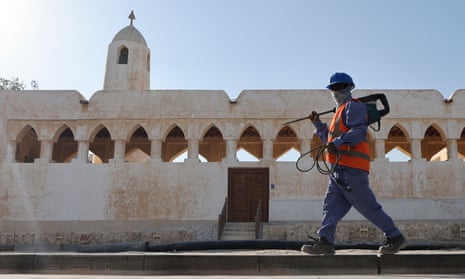Evangelical Christianity is quietly flourishing among migrant groups in the Gulf as churches provide low-paid workers facing horrific abuse with aid in times of crisis, according to pastors and parishioners across the region.
About 30 million migrant workers live in the Gulf Cooperation Council (GCC) states – Bahrain, Kuwait, Oman, Qatar, Saudi Arabia and the United Arab Emirates – the muscle transforming oil-based economies into glittering 21st-century metropolises.
In some Gulf states, migrants make up most of the population, and about 80% are employed in construction, hospitality and domestic jobs.
The Guardian has interviewed pastors and parishioners of churches in all six Gulf countries and found that migrants, including those from Hindu and Catholic communities, are converting to Pentecostalism, one of the fastest-growing religions on Earth with more than 600 million followers.
To cope materially and spiritually, many attend Pentecostal churches because they focus on people’s needs in the here and now – namely health and wealth – as well as the ever after.
Pastor John, who like everyone spoken to for this article asked to use a pseudonym as Gulf governments are suspicious of Christian movements and proselytising is often illegal, said his church was helping migrants who faced exploitation, financial hardship, domestic servitude and sexual abuse.
“Rape is a very, very common problem across the entire domestic help industry,” the pastor said. “And it’s not just females – males come to us because they get raped as well.”
Pentecostal churches tend to bring in people from ethnic and national groups whose governments are reluctant to take up cases of human rights violations with wealthy Gulf states for fear they will damage generous aid and trade packages.
Instead, spirit-led churches like this have become de facto unions for migrant workers, often acting as their first point of call in a crisis.
“If you go to the embassy, they will talk to your employer and get the local police involved,” the pastor said. “That’s a very intimidating situation for your normal person. In my experience, most of the brethren that face those challenges are labourers and they are very, very vulnerable to abuse.”
In cases of rape, the pastor said, the person would contact the church first, which would then coordinate with the embassy to arrange a way to escape.
“They have this special rescue team that communicates to get out of the building at a certain time and the car would be waiting for her,” the pastor said. “Obviously, in order for her to be able to trust this process, it needs to be arranged through someone who she actually knows – usually, that’s a church.”
Due to secrecy around conversion in the Gulf, the exact number of Christians in the region is not possible to ascertain, but church leaders and researchers agree there are significant numbers of migrant workers converting in Gulf countries. While they are expressly forbidden from proselytising to Muslims, it is understood that some Islamic workers choose to be “born again”.
In Qatar, home to 2.1 million migrant workers who make up about 75% of the population, Google Maps lists scores of Pentecostal churches. Yet, as with other Gulf nations, many churches choose to remain as underground “house” churches for fear that conditions may change.
At one such house church, which tells only trusted people its location via a WhatsApp dropped pin and a compound door left slightly ajar, the sisterhood is working overtime. On a hot Friday morning, a women’s apostle network explained how they had tried to look after rape victims.
“If an unmarried woman shows up [pregnant] in hospital, they will look for her marriage contract. If she can’t show anything, she is reported to the police and put in jail – and they’ll take her children,” said one of the group’s leaders, who asked to be called Sister Mary.
“Let’s just say that some churches have helped to hide the kids from the police. The pastor’s wife will look after them and she will try to get out while her tummy is still small. But you can’t hide kids for long.”
For some, converting to this fundamentalist form of Christianity marks their arrival as a global citizen and causes them to turn on their past. Pastor Luke, who has been working in one of the less strict Gulf states since 1991, is focused on converting people from Hinduism.
“In our church, we’re seeing several people taking water baptisms each month and definitely more people are coming here than ever,” he said.
Referring to adherents of his former faith as “idol worshippers”, he said people who converted tended to get their lives together – they settled down and got married, had children, and got promotions at work.
“People come from India and Pakistan to increase the status of their family, but they arrive at the labour camps and they’re so crowded, and there’s so much drinking and smoking,” he said.
“No one tells them that when they get here they often find more problems than they left behind.”
